Andrew Jacobsen
An Equivalence Between Static and Dynamic Regret Minimization
Jun 03, 2024Abstract:We study the problem of dynamic regret minimization in online convex optimization, in which the objective is to minimize the difference between the cumulative loss of an algorithm and that of an arbitrary sequence of comparators. While the literature on this topic is very rich, a unifying framework for the analysis and design of these algorithms is still missing. In this paper, \emph{we show that dynamic regret minimization is equivalent to static regret minimization in an extended decision space}. Using this simple observation, we show that there is a frontier of lower bounds trading off penalties due to the variance of the losses and penalties due to variability of the comparator sequence, and provide a framework for achieving any of the guarantees along this frontier. As a result, we prove for the first time that adapting to the squared path-length of an arbitrary sequence of comparators to achieve regret $R_{T}(u_{1},\dots,u_{T})\le O(\sqrt{T\sum_{t} \|u_{t}-u_{t+1}\|^{2}})$ is impossible. However, we prove that it is possible to adapt to a new notion of variability based on the locally-smoothed squared path-length of the comparator sequence, and provide an algorithm guaranteeing dynamic regret of the form $R_{T}(u_{1},\dots,u_{T})\le \tilde O(\sqrt{T\sum_{i}\|\bar u_{i}-\bar u_{i+1}\|^{2}})$. Up to polylogarithmic terms, the new notion of variability is never worse than the classic one involving the path-length.
Online Linear Regression in Dynamic Environments via Discounting
May 29, 2024Abstract:We develop algorithms for online linear regression which achieve optimal static and dynamic regret guarantees \emph{even in the complete absence of prior knowledge}. We present a novel analysis showing that a discounted variant of the Vovk-Azoury-Warmuth forecaster achieves dynamic regret of the form $R_{T}(\vec{u})\le O\left(d\log(T)\vee \sqrt{dP_{T}^{\gamma}(\vec{u})T}\right)$, where $P_{T}^{\gamma}(\vec{u})$ is a measure of variability of the comparator sequence, and show that the discount factor achieving this result can be learned on-the-fly. We show that this result is optimal by providing a matching lower bound. We also extend our results to \emph{strongly-adaptive} guarantees which hold over every sub-interval $[a,b]\subseteq[1,T]$ simultaneously.
Unconstrained Online Learning with Unbounded Losses
Jun 08, 2023Abstract:Algorithms for online learning typically require one or more boundedness assumptions: that the domain is bounded, that the losses are Lipschitz, or both. In this paper, we develop a new setting for online learning with unbounded domains and non-Lipschitz losses. For this setting we provide an algorithm which guarantees $R_{T}(u)\le \tilde O(G\|u\|\sqrt{T}+L\|u\|^{2}\sqrt{T})$ regret on any problem where the subgradients satisfy $\|g_{t}\|\le G+L\|w_{t}\|$, and show that this bound is unimprovable without further assumptions. We leverage this algorithm to develop new saddle-point optimization algorithms that converge in duality gap in unbounded domains, even in the absence of meaningful curvature. Finally, we provide the first algorithm achieving non-trivial dynamic regret in an unbounded domain for non-Lipschitz losses, as well as a matching lower bound. The regret of our dynamic regret algorithm automatically improves to a novel $L^{*}$ bound when the losses are smooth.
Parameter-free Mirror Descent
Apr 02, 2022Abstract:We develop a modified online mirror descent framework that is suitable for building adaptive and parameter-free algorithms in unbounded domains. We leverage this technique to develop the first unconstrained online linear optimization algorithm achieving an optimal dynamic regret bound, and we further demonstrate that natural strategies based on Follow-the-Regularized-Leader are unable to achieve similar results. We also apply our mirror descent framework to build new parameter-free implicit updates, as well as a simplified and improved unconstrained scale-free algorithm.
Continual Auxiliary Task Learning
Feb 22, 2022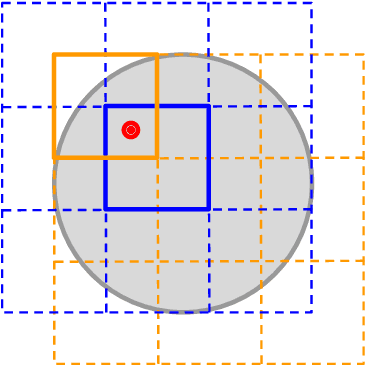
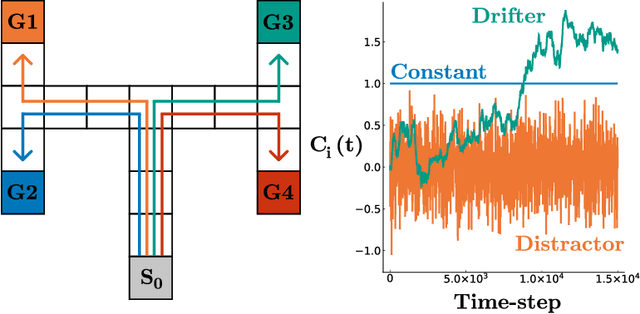
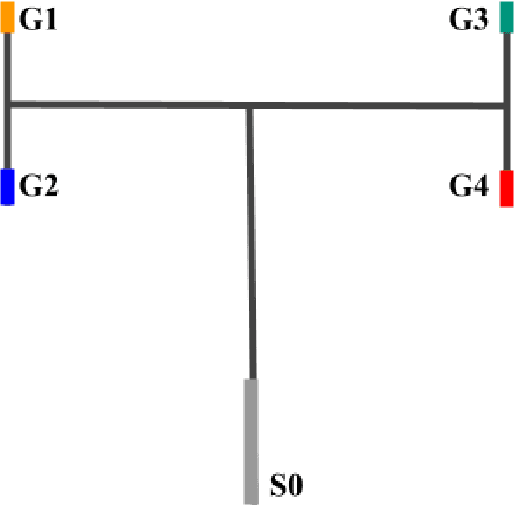
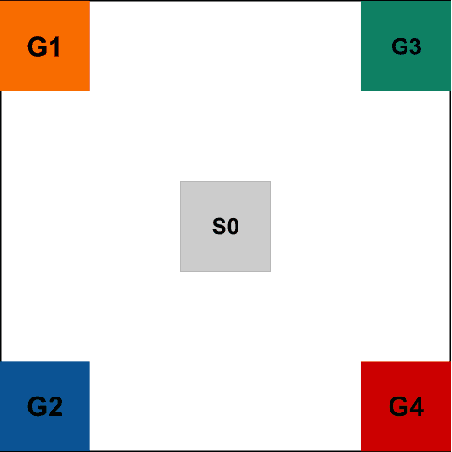
Abstract:Learning auxiliary tasks, such as multiple predictions about the world, can provide many benefits to reinforcement learning systems. A variety of off-policy learning algorithms have been developed to learn such predictions, but as yet there is little work on how to adapt the behavior to gather useful data for those off-policy predictions. In this work, we investigate a reinforcement learning system designed to learn a collection of auxiliary tasks, with a behavior policy learning to take actions to improve those auxiliary predictions. We highlight the inherent non-stationarity in this continual auxiliary task learning problem, for both prediction learners and the behavior learner. We develop an algorithm based on successor features that facilitates tracking under non-stationary rewards, and prove the separation into learning successor features and rewards provides convergence rate improvements. We conduct an in-depth study into the resulting multi-prediction learning system.
Parameter-free Gradient Temporal Difference Learning
May 10, 2021



Abstract:Reinforcement learning lies at the intersection of several challenges. Many applications of interest involve extremely large state spaces, requiring function approximation to enable tractable computation. In addition, the learner has only a single stream of experience with which to evaluate a large number of possible courses of action, necessitating algorithms which can learn off-policy. However, the combination of off-policy learning with function approximation leads to divergence of temporal difference methods. Recent work into gradient-based temporal difference methods has promised a path to stability, but at the cost of expensive hyperparameter tuning. In parallel, progress in online learning has provided parameter-free methods that achieve minimax optimal guarantees up to logarithmic terms, but their application in reinforcement learning has yet to be explored. In this work, we combine these two lines of attack, deriving parameter-free, gradient-based temporal difference algorithms. Our algorithms run in linear time and achieve high-probability convergence guarantees matching those of GTD2 up to $\log$ factors. Our experiments demonstrate that our methods maintain high prediction performance relative to fully-tuned baselines, with no tuning whatsoever.
Meta-descent for Online, Continual Prediction
Jul 17, 2019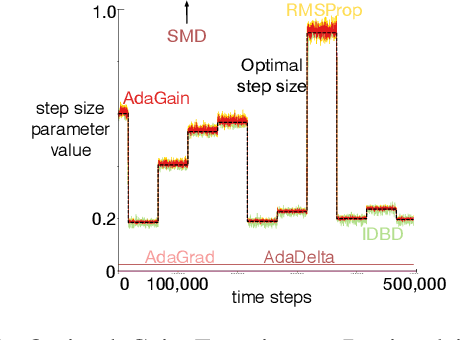
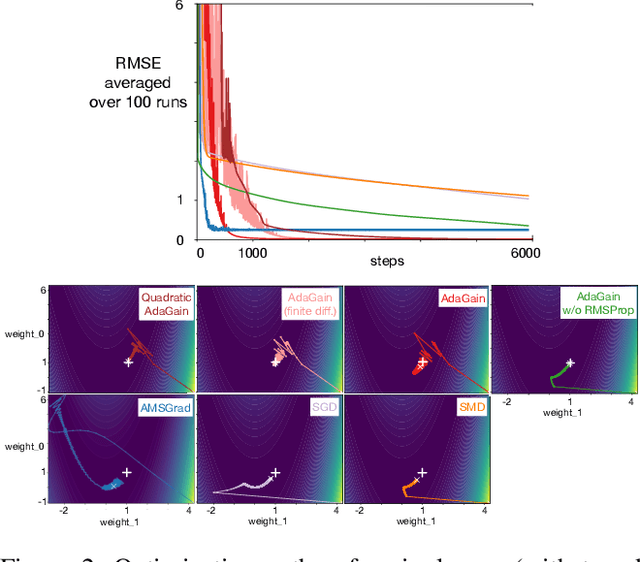
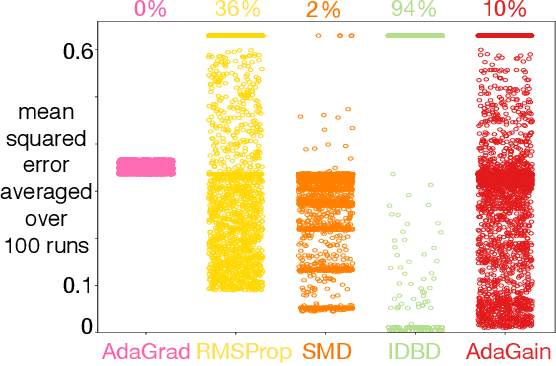
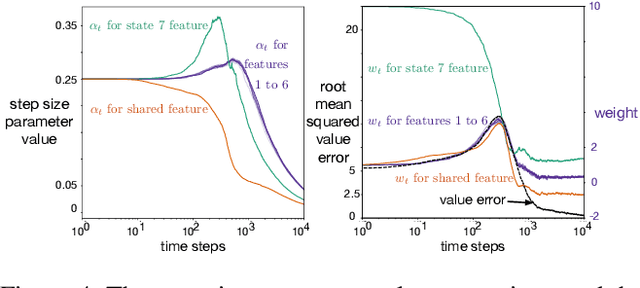
Abstract:This paper investigates different vector step-size adaptation approaches for non-stationary online, continual prediction problems. Vanilla stochastic gradient descent can be considerably improved by scaling the update with a vector of appropriately chosen step-sizes. Many methods, including AdaGrad, RMSProp, and AMSGrad, keep statistics about the learning process to approximate a second order update---a vector approximation of the inverse Hessian. Another family of approaches use meta-gradient descent to adapt the step-size parameters to minimize prediction error. These meta-descent strategies are promising for non-stationary problems, but have not been as extensively explored as quasi-second order methods. We first derive a general, incremental meta-descent algorithm, called AdaGain, designed to be applicable to a much broader range of algorithms, including those with semi-gradient updates or even those with accelerations, such as RMSProp. We provide an empirical comparison of methods from both families. We conclude that methods from both families can perform well, but in non-stationary prediction problems the meta-descent methods exhibit advantages. Our method is particularly robust across several prediction problems, and is competitive with the state-of-the-art method on a large-scale, time-series prediction problem on real data from a mobile robot.
 Add to Chrome
Add to Chrome Add to Firefox
Add to Firefox Add to Edge
Add to Edge